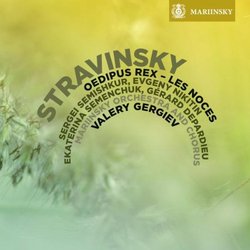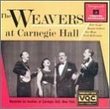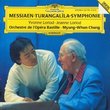| All Artists: Nitikin, Semishkur, Sementchuk, Mariinsky Orch, Mariinsky Chorus, Depardieu (narrator) Title: Stravinsky: Oedipus Rex, Les Noces (Hybr) Members Wishing: 0 Total Copies: 0 Label: Mariinsky Original Release Date: 1/1/2010 Re-Release Date: 6/8/2010 Album Type: Hybrid SACD - DSD, Import Genre: Classical Style: Symphonies Number of Discs: 1 SwapaCD Credits: 1 UPC: 822231851028 |
Search - Nitikin, Semishkur, Sementchuk :: Stravinsky: Oedipus Rex, Les Noces (Hybr)
 | Nitikin, Semishkur, Sementchuk Stravinsky: Oedipus Rex, Les Noces (Hybr) Genre: Classical
To date, each release from the Mariinsky label has featured music by some of the great Russian composers of the 19th, 20th and 21st centuries, each has whom has had strong connections with St. Petersburg. For the label s s... more » |
Larger Image |
CD DetailsSynopsis
Product Description To date, each release from the Mariinsky label has featured music by some of the great Russian composers of the 19th, 20th and 21st centuries, each has whom has had strong connections with St. Petersburg. For the label s sixth release, Valery Gergiev turns to the music of Igor Stravinsky, a composer who grew up in the city, attending performances at the Mariinsky Theatre where his father sang. Although less than four years separate the premieres of Les Noces and Oedipus Rex, they are two of the greatest works of two distinct phases in Stravinsky s career. Stravinsky dedicated Les Noces to Diaghilev (whose Ballet Russes gave the premiere) and it marks the crowning glory of Stravinsky s so-called second Russian period. The opera-oratorio Oedipus Rex is the first great work of Stravinsky s neo- classical period. It is sung here in Latin with Jean Cocteau s original French narration spoken by the well- known actor Gérard Depardieu. Similarly Requested CDs
|
CD ReviewsTwo stunning performances, especially of Les Noces Santa Fe Listener | Santa Fe, NM USA | 06/08/2010 (5 out of 5 stars) "The great glory of this new Mariinsky release is a stunning performance of Les Noces. I had seen a video of the company's staged ballet, itself a marvel of precision and rhythmic dynamism. Usually Les Noces works best with visuals, because the percussive effect of four pianos can become wearing on its own. There is also the problem of the high-lying vocal parts, modeled on Russian folk singing, that almost always comes across as abrasive, on the verge of screaming. All such considerations can now be put in the past. Gergiev's new version sounds as naturally Russian and accessible as Boris Godunov. The solo singers are to the manner born -- there is no screaming. Indeed, a new dimension of human warmth has been revealed. Moment by moment one marvels at how enjoyable this wedding is, how full of emotions that were concealed in performances where the performers were struggling just to avoid mistakes. The propulsive ostinato rhythms are unforgiving of even one misplaced eighth note. Gergiev's singers and musicians are undaunted and come through with a soaring, exhilarating reading.
I already had high expectation for Les Noces, but in concert and at the Met Gergiev's Oedipus Rex, a favorite work of his, had been rather coarse, and the main characters in Sophocles' tragedy sounded lumpen in the typical Soviet vein (no aristocrats, please, we're Communists). For this recording the whole conception has risen. We get one f the most riveting accounts on disc, fronted by superb orchestral playing and a compelling, at times lusty men's chorus. The narrator delivers Jean Cocteau's arch French narration with real conviction. Thus a powerful framework has been set up for the entry of the two most important elements -- Oedipus himself and his queen, Jocasta. I doubt that I will ever hear an Oedipus sung as tragically as that of Peter Pears, but tenor Sergei Semishkur is first rate. His voice is strong without being too beefy and operatic; the tone is firm and appealing; his dramatic involvement is impressive, even if he can't quite find a wrenching catharsis. The Jocasta of Ekaterina Semenchuk won't be so immediately appealing to everyone. The voice is full, mature, and plummy (try not to think of Buttercup in H.M.S. Pinafore), giving the impression of a contralto instead of the usual coloratura mezzo. There's no doubt that she is powerful, even marmoreal. Stravinsky might even have preferred such archetypal immobility. As far as the treacherous runs and intervals in Jocasta's great aria (often compared to early Verdi; one thinks of Abigaille in Nabucco), Semenchuk is spectacularly successful. I would compare her favorably to the equally powerful Martha Modl in Stravinsky's old mono recording, which also features Pears's best portrayal. As for the secondary characters, the Creon of Evgeny Nikitin could hardly be improved upon, and we get star casting for Tiresias (doubling the Messenger) with Mikhail Petrenko. But these are Mariinsky standouts all around. In short, Gergiev has achieved an outright triumph, aided by first-rate sonics, which I heard in two-channel stereo rather than the SACD layer. A must listen for anyone who loves these two masterpieces. Here's the complete lineup of performers: Les Noces --sung in Russian Mlada Khudoley (soprano), Olga Savova (mezzo), Alexander Timchenko (tenor), Andrei Serov (bass), Svetlana Smolina, Yulia Zaichkina, Alexander Mogilevsky, Maxim Mogilevsky (pianos) Oedipus Rex --sung in latin, with narration in French Sergei Semishkur (Oedipus), Ekaterina Semenchuk (Jocasta), Evgeny Nikitin (Creon & Messenger), Mikhail Petrenko (Tiresias), Alexander Timchenko (shepherd) & Gérard Depardieu (narrator)" |

 Track Listings (10) - Disc #1
Track Listings (10) - Disc #1








